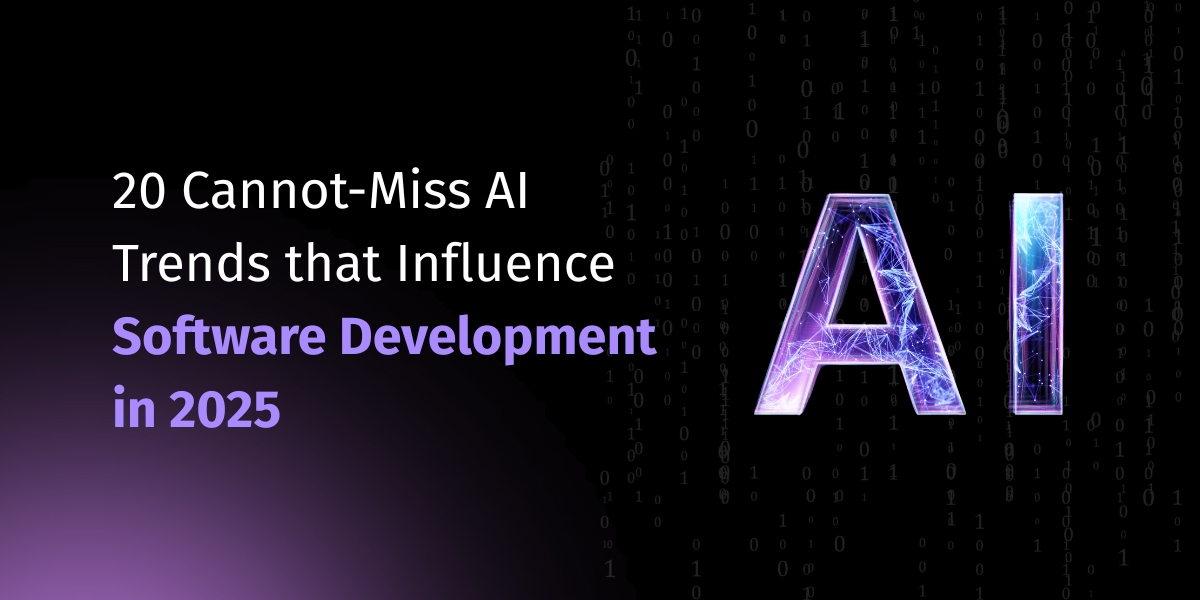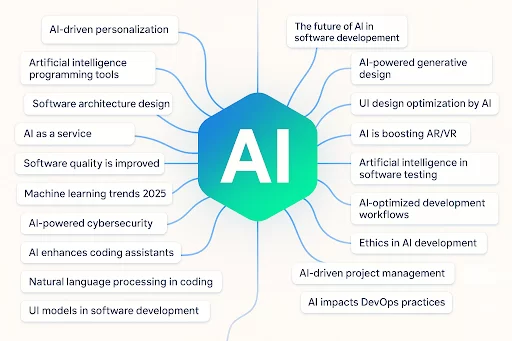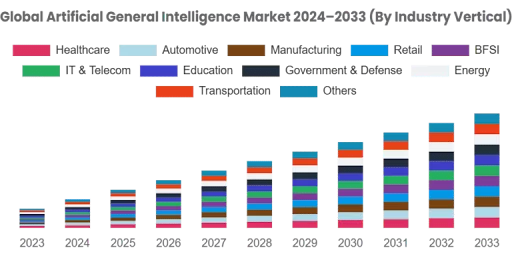 ChatGPT
ChatGPT
 Grok
Grok
 Perplexity AI
Perplexity AI

4 min read | By Postpublisher P | 23 April 2025 |
In 2025, AI will simply do that by revolutionizing how we develop and execute software. Developers will depend on AI to automatically create code, test software, and fix bugs. AI will improve security concerns, customize the user experience, and even assist in executing projects more effectively. Further, low-code platforms powered by AI will enable any individual to create apps without coding skills. With the benefits of AI in software development would become even more innovative and effective than before.

Artificial intelligence is reshaping DevOps, making the process more intelligent, recovering swiftly from downtime, and more optimally deploying applications. AI applications will further simplify testing, monitoring, and performance, making the entire software delivery process better.
AI generative models like OpenAI’s Codex are revolutionizing code generation, enabling developers to code faster and more efficiently. More sophisticated models of AI will assist in code writing, code refactoring, and code optimization.
No-code and low-code AI-powered platforms allow businesses to build apps with little programming expertise. They will keep evolving, paving the way for higher development cycles and quicker time to market in 2025.
Artificial intelligence in software development is improving the software testing process by automating repetitive testing and bug detection more effectively.AI will bring about smarter, more dependable software in 2025 with more sophisticated testing methods.
With cloud technology, AI is simplifying cloud-native development patterns like the adoption of containers, microservices, and serverless computing. AI will assist in orchestrating cloud-based applications and make them scalable and high-performing.
AI-based code review tools will continue to get better, offering developers automated means of finding bugs, security vulnerabilities, and inefficiencies in the code. This results in cleaner code and faster development times.
AI will be spearheading cybersecurity efforts in the area of how AI can detect and mitigate threats prior to occurrence. From anomaly detection to advanced threat protection, the influence of AI on security will only grow to protect software.

AI-driven personalization will enrich user experiences in software development by providing user-behavior-based custom-tailored features, recommendations, and interfaces. With the support of artificial intelligence programming tools, the future of AI in software development lies in producing highly dynamic and adaptive applications.
Chatbots powered by AI will continue to evolve, providing businesses with advanced customer support capabilities. They will offer personalized and context-aware interactions, improving customer satisfaction and operational efficiency.
AI will make UI design more efficient by automating procedures like layout optimizations, color scheme configurations, and element placement. By aligning with principles of software architecture design, this will lead to user-centric and straightforward designs, minimizing time used for manual tweaking.
AI will allow businesses and developers to derive actional intelligence from huge volumes of data. AI-powered analytics tools will assist in decision-making, optimize operations, and predict trends, offering a competitive advantage.
Autonomous systems, ranging from self-healing software to autonomous cars, will increase in 2025. AI will be a key factor in developing autonomous systems that can learn, adapt, and make real-time decisions.
NLP technologies will further augment software by allowing machines to comprehend and process human language. This will enable more natural interfaces, more intelligent virtual assistants, and more efficient content creation.
AI is boosting the capabilities of AR and VR, allowing for immersive experiences and better simulations. With the integration of AI as a service, software development will open up new possibilities for training, design, and user interaction.
Agile development practices are being transformed by AI, which can automate sprints, improve backlog management, and predict project timelines. AI will help agile teams improve productivity and predict bottlenecks before they occur.
As AI continues to become more and more embedded within development workflows, mitigating bias and ethical use of AI will be at the forefront. Throughout 2025, there will be a stronger emphasis on building AI models that are equitable, transparent, and unbiased.
AI will assist in maintaining legacy systems, providing predictive analytics that can identify when software needs updates or fixes. This will prolong the life of software systems and minimize expensive manual interventions.
While still emerging, quantum computing has the potential to revolutionize AI by providing processing power far beyond classical computers. As part of how AI is changing software development, expect quantum-inspired AI algorithms to start influencing software projects in 2025.
AI will take project management tools to the next level by predicting timelines, analyzing risks, and suggesting resource allocation strategies. These intelligent tools will enable more efficient project execution and improved team collaboration.
AI-powered generative design will transform how software architectures are built. By integrating data analysis and insights from machine learning trends 2025, AI will analyze and optimize architectural components, enabling developers to create more efficient, scalable, and sustainable software solutions.
▶ Adopt AI-powered tools for coding, testing, debugging, and project management to save time and improve accuracy.
▶ Integrate AI-driven security measures from the beginning to detect and prevent threats in real time.
▶ Build applications using cloud-native technologies like containers and microservices for better scalability and performance.
▶ Speed up development by using low-code or no-code platforms for simpler applications and prototypes.
▶ Use AI and DevOps best practices to automate repetitive tasks and ensure smooth, continuous delivery.
▶ Leverage AI for personalization and smart UI design to create better, more engaging user experiences.
▶ Follow ethical AI guidelines to build fair, unbiased, and responsible software systems.
▶ Stay updated with the top ai trends 2025 and continuously upgrade skills to keep pace with evolving tools and technologies.
AI is transforming software development trends 2025 to be quicker, wiser, and safer. From reducing code generation to enhancing testing and security, AI is assisting developers in creating quality software. With low-code platforms, cloud-native development, and AI-driven tools being the trends, software development is becoming more effective. AI is also improving user experiences and project management. With these trends growing, companies will be able to develop more innovative and trustworthy software.
Join over 150,000+ subscribers who get our best digital insights, strategies and tips delivered straight to their inbox.